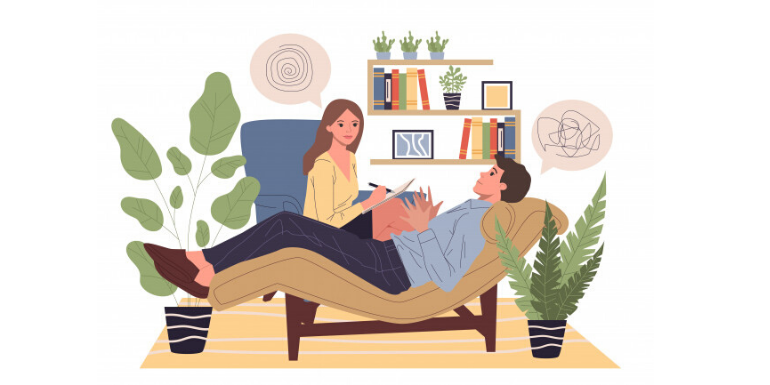Leading Factors to Consult the Best Psychologist in Delhi for Your Emotional Wellness
Leading Factors to Consult the Best Psychologist in Delhi for Your Emotional Wellness
Blog Article
The Role of Psych Therapy in Handling Stress And Anxiety and Clinical Depression
Psychiatric therapy has actually arised as a keystone in the management of anxiety and anxiety, using customized treatments that vary from Cognitive-Behavioral Treatment (CBT) to mindfulness-based techniques. These methods not just help individuals in determining and restructuring negative thought patterns but additionally foster present-moment recognition, reducing the propensity to ponder. As we check out the different dimensions of psychotherapy, it becomes evident that these approaches do even more than simply ease signs; they considerably enhance emotional law and social skills - Best Psychologist in Delhi. What remains to be analyzed is how these healing approaches can be successfully tailored to meet specific requirements, thus optimizing their influence.
Understanding Anxiety and Clinical Depression
Comprehending anxiousness and anxiety calls for a comprehensive consider these widespread mental health and wellness problems, which often exist together and dramatically impact an individual's every day life. Anxiousness is characterized by persistent, extreme fear and are afraid about everyday circumstances. Symptoms consist of uneasyness, rapid heart rate, and difficulty concentrating. On the other hand, clinical depression shows up as a prevalent sensation of vacuum, unhappiness, or sadness, often accompanied by a loss of interest in previously enjoyed tasks, adjustments in cravings, and rest disturbances.
The conjunction of stress and anxiety and clinical depression can complicate and worsen symptoms medical diagnosis and treatment. People struggling with both problems may experience a lot more severe signs, greater disability in work and social performance, and a longer duration of ailment. This comorbidity requires a nuanced understanding and strategy to treatment.
Cognitive patterns like unfavorable thinking and maladaptive habits can perpetuate these conditions. Comprehensive evaluation by psychological health and wellness specialists is crucial to discern the presence and extent of these conditions, paving the way for customized therapeutic strategies.
Sorts Of Psychotherapy
Psychotherapy, also known as talk treatment, incorporates a selection of therapy methods created to ease signs and symptoms of stress and anxiety and anxiety by attending to the underlying emotional and emotional problems. Different types of psychiatric therapy are customized to satisfy the distinct needs of people, giving a series of techniques to mental health treatment.
One commonly utilized kind is psychodynamic treatment, which concentrates on understanding and dealing with unconscious problems originating from very early life experiences. By discovering these ingrained issues, patients obtain understanding into their existing habits and emotional state.
Social Therapy (IPT) is an additional efficient modality that focuses on improving social connections and function to lower depressive signs. It generally addresses problems such as grief, duty transitions, and social disputes.
Humanistic treatments, such as Client-Centered Therapy, stress personal development and self-actualization. Best Psychologist in Delhi. These approaches produce a supportive atmosphere where people can explore their sensations and develop a more powerful sense of self
Finally, Dialectical Actions Therapy (DBT) incorporates cognitive-behavioral techniques with mindfulness methods. Originally established for borderline individuality disorder, DBT has actually been adapted to deal with anxiousness and depression by mentor abilities in distress tolerance, psychological law, and interpersonal efficiency.
These varied psychotherapeutic approaches provide numerous pathways to mental health and wellness and health, satisfying individual choices and healing this needs.
Cognitive-Behavioral Therapy (CBT)
Among the different psychotherapeutic techniques, Cognitive-Behavioral Treatment (CBT) stands out for its structured, goal-oriented method in dealing with anxiety and anxiety. Created by Aaron T. Beck in the 1960s, CBT is based on the principle that maladaptive thinking patterns add significantly to psychological distress and behavioral issues. By identifying and reorganizing these unfavorable thought patterns, CBT intends to relieve symptoms and foster much healthier cognitive procedures.
The therapy includes a selection of strategies, including cognitive restructuring, direct exposure treatment, and behavioral activation. Cognitive restructuring concentrates on challenging and modifying distorted cognitions, while direct exposure treatment slowly accommodates people to anxiety-provoking stimulations, decreasing evasion behaviors.
Empirical proof emphasizes the efficiency of CBT, with various research studies demonstrating its efficiency in reducing signs and symptoms of anxiety and clinical depression. This therapeutic strategy has actually been adapted for numerous populaces and settings, showing flexible and versatile. Its structured nature, empirical assistance, and concentrate on skill purchase make CBT a cornerstone in the psychotherapeutic treatment of anxiety and depression.
Mindfulness-Based Techniques
Mindfulness-Based Methods have actually gathered substantial focus over the last few years as reliable interventions for stress and anxiety and depression. Rooted in old meditation methods, these techniques intend to grow an increased recognition of the existing minute, which can help individuals disengage from the ruminative idea patterns frequently connected with anxiousness and depressive conditions.

Similarly, Mindfulness-Based Cognitive Therapy (MBCT) incorporates principles from Cognitive-Behavioral Therapy (CBT) with mindfulness methods. MBCT is specifically efficient in avoiding regression in individuals with frequent anxiety. By identifying early indication of depressive episodes, individuals learnt MBCT can use mindfulness practices to alleviate the onset of full-blown episodes.
Advantages of Psychiatric Therapy
Countless research studies have shown the extensive benefits of psychiatric therapy for people grappling with stress and anxiety and clinical depression. Psychotherapy equips people with coping strategies to manage upsetting feelings, consequently decreasing signs and symptoms of stress and anxiety and clinical depression.
Additionally, psychiatric therapy offers an organized environment for self-exploration and insight. By reviewing their experiences and sensations with a trained therapist, people can reveal underlying concerns adding to their psychological wellness struggles. This self-awareness is an essential step towards lasting healing and strength.
Another significant advantage is the enhancement of social skills. Stress and anxiety and clinical depression often strain relationships, leading to isolation. With healing interventions, individuals learn reliable interaction and conflict-resolution skills, which can enhance their communications original site and foster supportive connections.
In addition, psychiatric therapy offers a tailored technique to therapy. Therapists can adapt methods to fulfill the special demands of each patient, guaranteeing a personalized treatment strategy. This modification enhances the efficacy of treatment, promoting sustained mental health and wellness enhancements. Eventually, the benefits of psychotherapy prolong beyond sign alleviation, adding to general health and top quality of life.

Conclusion
Psychotherapy considerably adds to the administration of stress and anxiety and anxiety by using reliable coping methods and a safe and secure setting for self-exploration. Strategies such as Cognitive-Behavioral Treatment (CBT) and mindfulness-based strategies contribute in recognizing and reorganizing unfavorable idea patterns, while advertising present-moment recognition. These customized treatments not only reduce symptoms but also boost psychological policy and interpersonal skills, therefore boosting general well-being and lifestyle for people dealing with these mental health obstacles.
Psychiatric therapy has emerged as a keystone in the monitoring of anxiety and depression, supplying tailored interventions that vary from her latest blog Cognitive-Behavioral Therapy (CBT) to mindfulness-based approaches.Recognizing stress and anxiety and depression calls for a detailed look at these widespread psychological health problems, which typically coexist and dramatically effect an individual's everyday life.Among the different psychotherapeutic modalities, Cognitive-Behavioral Treatment (CBT) stands out for its structured, ambitious method in dealing with anxiety and clinical depression.Various researches have shown the profound advantages of psychotherapy for people grappling with anxiety and clinical depression. Psychotherapy furnishes patients with coping approaches to manage stressful emotions, thus lowering symptoms of stress and anxiety and clinical depression.
Report this page